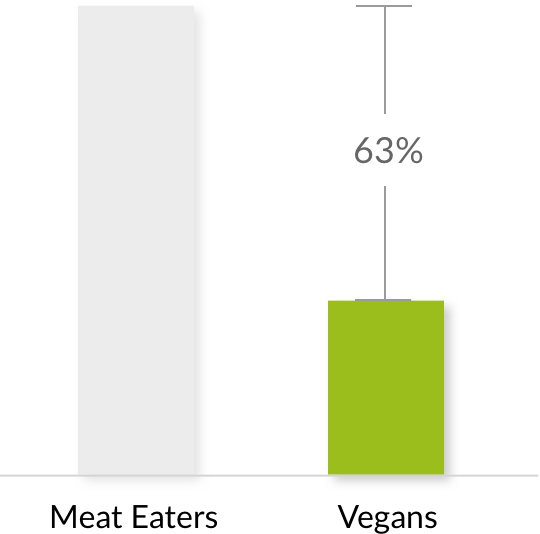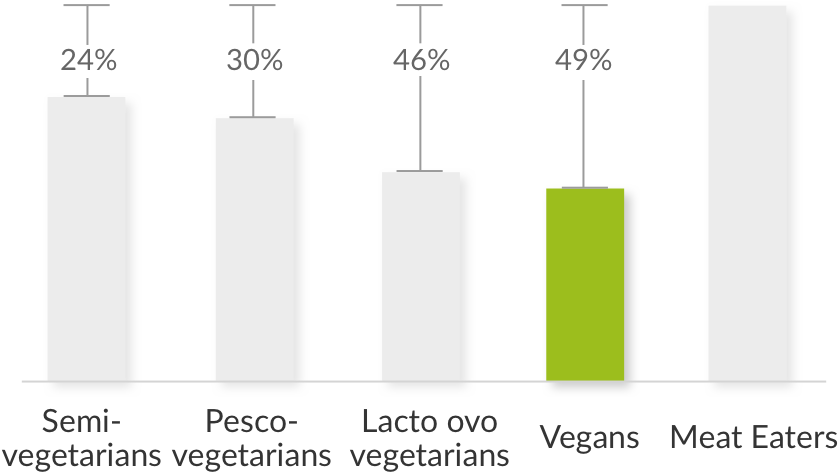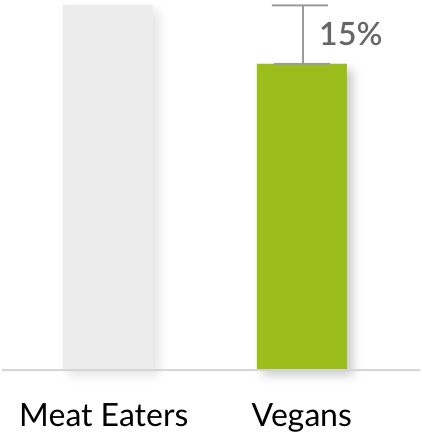
 Vegans & Hypertension
Vegans & Hypertension
According to a 2012 study published by Public Health Nutrition Journal, vegans have a 63% lower risk of hypertension than non vegetarians.
This 2012 study compared hypertension risk of vegans versus as compared to other vegetarian groups and non-vegetarians. The study concluded that vegans have lower systolic and diastolic blood pressure(BP) resulting in 63% lower risk of hypertension than omnivores. Lower body mass, non-animal protein sources, and higher potassium and fiber intake all contribute to this reduction in risk for vegans.
Pettersen, Betty J et al. Public Health Nutrition (2012 October ; 15(10): 1909–1916. doi:10.1017/S1368980011003454)

Decreased Risk of Hypertension in Vegans
Relative to meat eaters
 Vegans & Cancer
Vegans & Cancer
According to a 2016 study in the Critical Reviews in Food Science and Nutrition, vegans have a 15% lower incidence of all types of cancer, 34% lower risk of female-specific cancer and 22% lower risk of colorectal cancer.
In a study that included 56,000 vegan participants, vegans had significantly lower levels of cancer when compared to non-vegans. The reasons for the beneficial effects of veganism on cancer lie mainly on the lower intake of total and saturated fats in a vegan diet. Reduced cancer risk is also associated with vegans' large consumption of foods known to decrease cancer risk, such as soybean, legumes, nuts and vegetable oils. Additionally, vegans can absorb more carotenoids, disease-fighting pigment, and polyphenols, that help prevent degenerative diseases like cancer.
Dinu et al. Crit Rev Food Sci Nutr. (2016; ahead of print; DOI:10.1080/10408398.2016.1138447)

Vegans & Cancer
According to a 2016 study in the Critical Reviews in Food Science and Nutrition, vegans have a 15% lower incidence of all types of cancer, 34% lower risk of female-specific cancer and 22% lower risk of colorectal cancer.
In a study that included 56,000 vegan participants, vegans had significantly lower levels of cancer when compared to non-vegans. The reasons for the beneficial effects of veganism on cancer lie mainly on the lower intake of total and saturated fats in a vegan diet. Reduced cancer risk is also associated with vegans' large consumption of foods known to decrease cancer risk, such as soybean, legumes, nuts and vegetable oils. Additionally, vegans can absorb more carotenoids, disease-fighting pigment, and polyphenols, that help prevent degenerative diseases like cancer.
Dinu et al. Crit Rev Food Sci Nutr. (2016; ahead of print; DOI:10.1080/10408398.2016.1138447)
 Vegans & Diabetes
Vegans & Diabetes
According to a 2009 study published in Diabetes Care Journal, vegans have a 49% lower risk of type 2 diabetes.
The 5-unit BMI difference between vegans and non-vegans indicates a substantial potential of veganism to protect against obesity and diabetes. In the study, inclusion of any meat or fish, even on a less than weekly basis, seems to limit some of the protection associated with a vegan diet. The study also concluded that the portfolio of foods found in vegan diets may carry metabolic advantages helping reduce type 2 diabetes risk by 49%.
Tonstad et al. Diabetes Care Journal (2009, 32:791–796; doi 10.2337/dc08-1886)

Vegans & Diabetes
 Vegans & All-Cause Mortality
Vegans & All-Cause Mortality
According to a 2013 study published by Journal of the American Medical Association, vegans have a 15% lower risk of all-cause mortality compared to meat eaters.
The Adventist Health Study 2 (AHS-2) is a large North American prospective cohort study. A total of 96 469 Seventh-day Adventist men and women recruited between 2002 and 2007, from which an analytic sample of 73 308 participants remained after exclusions. The authors of the paper conducted a mortality analysis by Cox proportional hazards regression, controlling for important demographic and lifestyle confounders. Diet was assessed at baseline by a quantitative food frequency questionnaire. The findings of the present study are similar to those of prior North American Adventist cohorts, demonstrating a consistent association over several decades and replicating prior results in a population with greater geographic and ethnic diversity.
Orlich et al. JAMA Int Med. (2013)

Vegans & All-Cause Mortality
According to a 2013 study published by Journal of the American Medical Association, vegans have a 15% lower risk of all-cause mortality compared to meat eaters.
The Adventist Health Study 2 (AHS-2) is a large North American prospective cohort study. A total of 96 469 Seventh-day Adventist men and women recruited between 2002 and 2007, from which an analytic sample of 73 308 participants remained after exclusions. The authors of the paper conducted a mortality analysis by Cox proportional hazards regression, controlling for important demographic and lifestyle confounders. Diet was assessed at baseline by a quantitative food frequency questionnaire. The findings of the present study are similar to those of prior North American Adventist cohorts, demonstrating a consistent association over several decades and replicating prior results in a population with greater geographic and ethnic diversity.
Orlich et al. JAMA Int Med. (2013)
 Vegans & Cardiovascular Disease
Vegans & Cardiovascular Disease
According to a 2013 study published by Journal of the American Medical Association, when adjusted for body mass index, male vegans have a 19% lower risk of mortality from cardiovascular disease compared to meat eaters.
The Adventist Health Study 2 (AHS-2) is a large North American prospective cohort study. A total of 96 469 Seventh-day Adventist men and women recruited between 2002 and 2007, from which an analytic sample of 73 308 participants remained after exclusions. The authors of the paper conducted a mortality analysis by Cox proportional hazards regression, controlling for important demographic and lifestyle confounders. Diet was assessed at baseline by a quantitative food frequency questionnaire. The findings of the present study are similar to those of prior North American Adventist cohorts, demonstrating a consistent association over several decades and replicating prior results in a population with greater geographic and ethnic diversity. The effects tended to be generally stronger and more significant in men than women. The researchers think that the dietary patterns of lower saturated fat and higher fiber consumption are possible reasons for the reduced cardiovascular risk.
Orlich et al.JAMA Intern Med (2013)

Vegans & Cardiovascular Disease


We are a licensed life insurance agent* in all 50 states.
View our licenses
We negotiated lower rates on life insurance using science and data.
View our research
By vegans for vegans. Our team is comprised of health conscious people who overcame their own health challenges with healthy habits, exercise, and nutrition.
Meet our team














